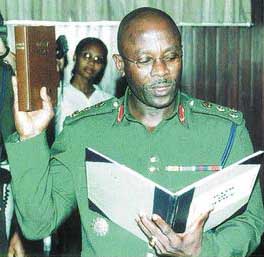Please see the posting of the transcript (courtesy,
Kaieteur News) of the controversial conversation between
Police Commissioner Winston Felix and Vice Chairman of the PNC,
Basil Williams, recorded anonymously. We post it here because
we are convinced that it points to possible sinister plans being
prepared by the PNC to (possibly) disrupt the upcoming elections
amongst other things. It also shows a commisioner who has compromised
his Oath of Office and, to say the least, leaves the public or
a significant section of it with doubts about his role as "top
cop."
TRANSCRIPT
OF THE FELIX-WILLIAMS CONVERSATION
Questions to ask pertaining to the transcript:
Who
is referred to as "number one"? Is it PNC Leader, Robert
Corbin?
Why
is the Commissioner divulging information (e.g., that the Home
Affairs Minister called him) so readily to Williams?
Why
does the Commissioner mean by "they" when he said "they"
killed Shaka Blair and now the kill Ronald Waddell? Is he directly
pointing to the police Target Special Squad (TSS or Black Clothes)
or the PPP Government? Or both? After all, Blair was killed by
the police under a PPP regime, despite the police claiming otherwise.
Felix, as some know, does not like the TSS. Given that no one
has claimed the killing of Waddell (and even Williams noted this
in the conversation), how could the Commissioner make this claim?
Should he be seen as hiding info from the public, or obstructing
a case from being solved by not making his views public?
What
"threat" was Basil Williams taking about when he said
"of threats and stuff like duh?" Street violence? Gunplay?
Criminal attacks? And when? During elections to prevent people
from going to vote? Or are thee really relating to a
security detail regarding World Cup Cricket?
Who is his "group"?
The PNC? A cell? One of Many? What "matter" was Williams
asking about?
How many "matters" are
there, since the Commissioner asked "which one" Williams
queried about?
What
does the Commissioner means by him and "number one"
having to "refine our position about it"? What is the
position?
Is it a plan to be executed by the PNC while Felix/ the police
play absent from or blind to?
Why
did the Commissioner lie to the public about who committed the
Agricola massacre?
Other questions...
Why did Commissioner prohibit
a certain kind of machine gun from further use, after it had successfully
killed a number of gunmen a few years ago, thereby reducing the
police’s ability to confront criminals?
Why does he ignores certain crime hotspots such as behind Grove
(Kaneville), where a camp was established by criminals—and
which was made clear to the Commissioner?
Why has the Commissioner placed a clamp on the issuance of firearms,
which ordinary people who own businesses etc, still deserve to
have?
________________________________________________________________________________________________________________________
Commissioner
Felix—A Great Career Suddenly Over?
"I
have just taken the Oath of Office to perform my duties according
to the Constitution of this country. Hold me accountable for that
Oath."
—Winston Felix, new Police Commissioner
One finds it very suspicious that the army-police
“raids” on properties of Roger Khan etc., were done
NOT to recover missing weapons, but for something else. Or as
Roger Khan alluded, the “forces” had “ulterior
motives.” The army had 3 long weeks to raid these locations,
particularly soon after they made the discovery at the bond. So
why these raids were executed the day before the controversial
tape/CD surfaced? It seems as if they were searching for the tape/CD
and used the “weapons” as a pretext or excuse.
It is also very questionable that the joint forces
talked about weapons, while the PNC argued that the raids were
a challenge to “organized crime.” Who is correct?
Something is missing here. Maybe the Commissioner of Police, Mr.
Winston Felix, and the army’s Chief of Staff, Brigadier
Edward Collins, assume that Guyanese are idiots. Perhaps some
think the force of the gun can replace the force of truth, and
perhaps some think people outside the army are accountable for
guns kept by people inside the army.
There are so many smaller questionable issues—this
entire episode is strewn with brazen unscrupulousness from the
army. It is now prosecuting one of its own after 20-odd years
of service—and for what? For a kit or a helmet that the
army itself has refused to take back. (One wonders who else retired
from the army and has stuff home.) Let us accept that doors were
broken down as if by “kick-down-the-door” bandits
because keys were not available; let us even forget momentarily
that either no warrants (or bogus warrants) were produced; let
us even ignore that quite possibly cocaine was planted to frame
people; still, there is the alleged strange case of “expensive
liquor” being expropriated. Is the public to believe that
these AK-47s could be inside rum bottles or casks?
Now, I read a transcript of the alleged conversation
between the Commissioner and PNC MP, Mr. Basil Williams, two very
important public figures. In Guyana, people say anything anyhow.
Nevertheless, it is just impossible for the public toignore or
take lightly some of what was said. The mentions of impending
“threats and stuff like duh” to be staged possibly
during World Cup cricket; talks about taking guns into the stadium
(Why would anyone take guns to a cricket match? To ensure the
umpire is fair?); of the Commissioner and someone called “number
one” having to “refine” some plan that seemed
unmentionable; all these things point to, at the least, grave
compromise of integrity by the Commissioner.
If the words themselves do not trouble, the nuances
of a public servant of imminent stature uttering them will reverberate
across every quarter, wherever Guyanese are listening and watching.
That rhetoric of a possible subversion of a national election
through a climate of fear engineered to force a constitutional
crisis was entertained by a police Commissioner is what violates
the public’s trust.
When the Commissioner was appointed, many sincerely
believed that Guyana had a strong, no-nonsense public servant
in him. He was selected on good faith and good service. PNC supporters
told him to “don’t drink milk,” meaning become
a PPP agent. The Commissioner himself said; “Hold me accountable…”
Now, it is clear that not only has he become prejudiced, but places
the public interest below his private affairs. Let me explain:
it is unacceptable for a Commissioner whose public practice regarding
high-profile crimes is to be tight-lipped, but who has much to
say aboutcrimes and sensitive issues, with selected people of
selected political parties.
Of course, what is worse is to have a police
chief that willfully deceives—as when he misled the public
in the Agricola massacre, alluding to Ashmins (“I deliberately
turn the thing away”) as being behind the attack. Without
needing this tape, the public knew the Commissioner had blundered
seriously. Even the PNC which applauded the Commissioner in 2003,
saying how “his elevation to this office comes at a time
when the competence and confidence of the Guyana Police Force
is seriously questioned,” must agree that this “competence”
has been jeopardized. Further, the “full support of [the]
Government…and confidence” expressed in Mr. Felix
by President Jagdeo in February 2003 has been shattered. This
became obvious this week when the Commissioner pondered as to
whether this Government had eavesdropped on him. Come what may,
there are a few hard decisions at hand, the kind made only by
a President. The President must act soon.



